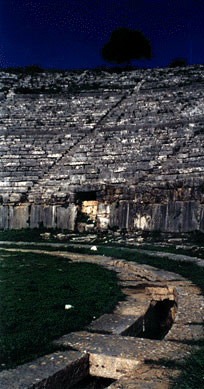
Photograph, © Copyright, 2010, Bruce A. McMenomy.
Week 12: Euripides (484 - 407/6 B.C.)
Please have read by class time this week:
- A general introduction to Greek drama, if you haven’t read it already; otherwise, at least review it.
- The Bacchae of Euripides.
- [Any other Euripides play that catches your attention (optional).]
- The Helen of Euripides.
If the plays of Sophocles leave any doubts about the character and intent of the gods, the Bacchae (sometimes the Bacchantes) of Euripides does not: it is one of the author’s most famous plays, and if it were to be filmed today, it would doubtless be considered a horror movie. It expresses a bleak, appalling attitude that the disastrous end of the Peloponnesian War can only partially explain.
Don’t read this one too late at night: if it doesn’t give you bad dreams, it’s because you haven’t been paying attention. I would like you to look specifically at characterization, bearing in mind some of the things we discussed after reading Auerbach. What does Euripides do to bring these characters alive in a particular way? Do they seem to be individuals? How do they compare with the characters in Aeschylus’ and Sophocles’ plays? Are they mouthpieces for positions, or are they instead three-dimensional people?
The Bacchae is available in your Ten Greek Plays or The Greek Plays volume.

Photograph, © Copyright 1999,
Mary L. J. McMenomy
As a way of looking a little more objectively at the structure of this play (and as a way of achieving a useful oversight of its contents), I have prepared a chart showing how it breaks down into parts, identifying the prologue and the six distinct episodes and the six choral songs.
With this week’s reading, I am departing from my usual procedure, and having you read one of Euripides’ more obscure plays: the Helen is an intriguing work, but very different from the tragedy you have seen so far, and certainly very different from the Bacchae. It is effectively melodrama, with clearly delineated villains, a grievously misunderstood lady in distress (Helen herself), and some comically inflated characters. It lampoons Menelaus as an ineffectual leader, more concerned with striking poses than with solving the problem. This is perhaps a jab at Homer; perhaps it is just a new kind of characterization we haven’t seen before. Much of it is quite funny. Underneath the surface, though, is the dark subtext — for it depends on the notion that the whole Trojan War was contrived by the gods as a deception, and was fought, in the last analysis, for no reason at all, since Helen herself had never gone to Troy.
The Helen is not in Ten Greek Plays, but it is available in The Greek Plays. If you don’t have the latter volume, you will have to get the play either at the Perseus site (with all its piecemeal paging) or in the somewhat easier to read translation in the Internet Classics Archive site, or through a bookstore or a library. The Helen is relatively hard to find in even a moderate-sized bookstore: it would really take a pretty large one to stock this regularly. Many public libraries will also not have it separately, but most should have it in some collected edition of Greek drama.
Consider for class discussion:
- How has Pentheus incurred guilt? Is any of this Pentheus’ fault?
- Are the old men of Thebes — here mere caricatures of the figures in Sophocles’ Theban plays — to be admired or pitied for getting themselves up in this outlandish manner?
- Is there anything anyone can do about it? What is the role of inherited guilt in the process?
- What does this say about the gods?
- What is the attitude people might be expected to have toward the gods, and how should one behave toward them?
About the Bacchae in particular:
About the Helen in particular:
About both plays:
Contents of this page © Copyright 2001, 2003, 2006, 2010 by Bruce A. McMenomy.
Permission to print or reproduce this page is hereby given to members of Scholars Online for purposes of personal study only. All other use constitutes a violation of copyright.